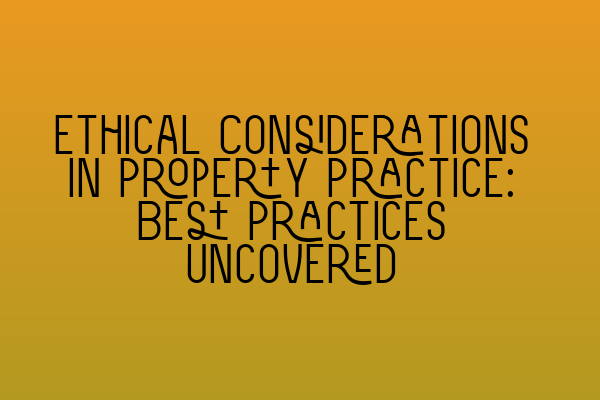Ethical Considerations in Property Practice: Best Practices Uncovered
As property lawyers, it is not only our duty to provide expert legal advice and assistance to our clients, but also to uphold the highest ethical standards in our practice. Property transactions involve significant financial investments and have a profound impact on individuals and communities alike. Therefore, it is essential that we act responsibly and ethically in order to maintain the trust of our clients and contribute to the well-being of society as a whole.
In this blog post, we will uncover some of the best practices that property lawyers should follow to ensure ethical considerations are prioritized in their practice.
1. Full Disclosure
One of the most important ethical considerations in property practice is the duty to provide full and accurate disclosure to clients. This means being transparent about any potential conflicts of interest, disclosing all relevant information about the property, and ensuring that clients understand the implications of their decisions. By practicing full disclosure, property lawyers can build trust and foster long-lasting relationships with their clients.
For example, if you are representing a client who is purchasing a property that has known structural issues, it is crucial to disclose this information to them. Even if it may potentially discourage the client from proceeding with the transaction, it is your ethical obligation to provide them with all pertinent information to make an informed decision.
2. Upholding Confidentiality
Confidentiality is a cornerstone of the solicitor-client relationship. Property lawyers must maintain strict confidentiality and protect client information at all times. This includes safeguarding sensitive personal and financial information, as well as any privileged communications between the lawyer and client.
It is imperative to have robust protocols in place to protect client data from unauthorized access or disclosure. This may involve implementing physical security measures, using secure communication channels, and regularly updating and maintaining cybersecurity systems.
3. Avoiding Conflicts of Interest
Conflicts of interest can compromise the integrity of a property lawyer’s practice and undermine the trust of clients. It is vital to identify and address potential conflicts of interest at the earliest possible stage to prevent any adverse consequences.
For instance, if you have previously represented the seller of a property, it may create a conflict of interest to later represent a buyer interested in purchasing the same property. In such cases, it is essential to disclose the conflict of interest to both parties and, if necessary, withdraw from representing either party to avoid any perception of bias or impropriety.
4. Competence and Continuing Professional Development
Property law is a complex and evolving field, and it is crucial for property lawyers to continually update their knowledge and skills to provide the highest level of service to clients.
By staying informed about changes in legislation, case law, and industry best practices, property lawyers can better serve their clients’ interests and avoid any potential ethical pitfalls. Participating in relevant training programs, attending seminars, and engaging in continuing professional development are essential steps to maintaining competence and staying at the forefront of the field.
5. Putting Clients’ Interests First
Property lawyers must always prioritize their clients’ interests above all else. This means acting in a diligent, competent, and efficient manner to ensure clients receive the best possible advice and representation.
Whether negotiating contracts, conducting due diligence, or resolving disputes, property lawyers should always strive to achieve the best outcome for their clients. This includes providing realistic assessments of the risks involved in a transaction and advising clients on the legal implications of their decisions.
By consistently placing clients’ interests first and acting in their best interests, property lawyers can develop a strong reputation and establish themselves as trusted advisors in the field.
Conclusion
Ethical considerations play a vital role in property practice, and property lawyers have a responsibility to follow best practices to ensure the highest ethical standards are upheld. By practicing full disclosure, upholding confidentiality, avoiding conflicts of interest, maintaining competence, and prioritizing clients’ interests, property lawyers can contribute to the integrity of the profession and serve as trusted advisors to their clients.
For more information on SQE exams and preparation courses, please visit SQE 1 Practice Exam Questions, SQE 1 Practice Mocks FLK1 FLK2, SQE 2 Preparation Courses, SQE 1 Preparation Courses, and SRA SQE Exam Dates.
